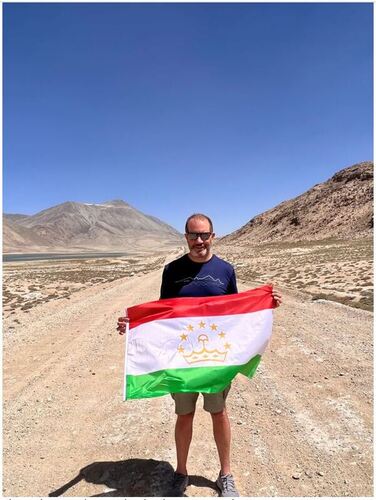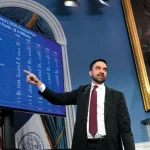
–>
July 25, 2022
Last winter I wrote about an adventure trip I took with my son to Iraq. Our latest trip was to Central Asia, specifically the countries of Tajikistan and Kazakhstan.
‘); googletag.cmd.push(function () { googletag.display(‘div-gpt-ad-1609268089992-0’); }); }
What lessons can an American learn taking the road less traveled to remote and exotic parts of the world?
The trip began with a call from my son, who works in the airline industry, and who has traveled to 151 countries thus far, asking me if I wanted to go on another adventure trip with him. Enthusiastically answering ‘yes’ but hesitating to ask where, I had to check a map to see where I would be traveling over our two-week jaunt.
He has visited most of the low-hanging fruit countries, so all that’s left are places no one has ever heard of, or else is afraid to go anywhere near. My friends thought once again I was crazy for going to the ends of the earth rather than to a normal tourist destination like Alaska or a large European city.
‘); googletag.cmd.push(function () { googletag.display(‘div-gpt-ad-1609270365559-0’); }); }
The U.S. State Department warned for both countries, Tajikistan and Kazakhstan, of the dangers of terrorism and civil unrest, although on these trips, I feel far safer than I would venturing into nearby downtown Denver late at night or other American crime-ridden cities like Chicago, Baltimore, or Philadelphia.
Just like our trip to Iraq, we hired a car, driver, and guide to take us from Dushanbe, Tajikistan east into one of the most remote parts of the world, the Wakhan Valley between Tajikistan, Afghanistan, Pakistan, and Kyrgyzstan.
Driving along the Panj River, Afghanistan on the other side of the raging waters, gave a glimpse of life in that war-torn country after America abruptly and foolishly exited last year, leaving the Taliban in charge. In the scorching heat, Afghan women are dressed head to toe in black burkas, working in the fields. Aspirations of girls and women to attend school or earn a professional degree are a thing of the past, thanks to President Biden pulling America out of Afghanistan, leaving with our tails between our legs.
Taliban patrols, flying the Taliban flag with likely an American made-machine gun mounted on the bed of an American pick-up truck, all left behind during our ignominious withdrawl, patrolled the dirt roads between small villages, all souvenirs of the cut and run American presence for almost 20 years in that country.
Did we belong in Afghanistan that long? Probably not, but there are ways to leave, and we did it the wrong way. But I digress.
Seeing what life is like in an Afghan village gave me a sense of gratitude for the abundance in my life as an American.
‘); googletag.cmd.push(function () { googletag.display(‘div-gpt-ad-1609268078422-0’); }); } if (publir_show_ads) { document.write(“
We climbed into the mountains and drove along the high-altitude Pamir Highway, part of the Old Silk Road connecting China with markets to the West. Described by the BBC as “One of the world’s most remote highways” it lived up to its reputation. Life is simple in the small villages, with limited electricity and many sleeping in yurts, yet with satellite dishes, a mix of ancient and modern.

The author standing on the desolate Pamir Highway
They farm their own food as Whole Foods and Door Dash don’t exist in that part of the world. The food is fresh and healthy, unlike so much of what we eat in America. Obesity is not an issue due to a healthy diet and active lifestyle.
Next was Almaty, Kazakhstan, a wealthier country than Tajikistan. There was a heavy overtone of the old Soviet Union, with many drab buildings, monuments, and wide sidewalks, although there was a growing new vibrancy with abundant coffee shops and restaurants.
Both countries tout themselves as “democracies” but they are led by charismatic authoritarian figures, with high marks for corruption and low marks for human rights. Supposedly America shines in these arenas, but one only has to look at selective justice here to see that there is little shine left for American principles.
Contrast the treatment of those held in contempt of Congress, Steve Bannon versus those not, Eric Holder, James Clapper, and John Brennan. Or January 6 protesters still in jail versus BLM and Antifa protesters running free. We too have authoritarian leaders, some with charisma like Barack Obama, and others without like Joe Biden.
Yet America is still a magnet to many in the world. I was told many times, “I would love to have your passport.” Yet they struggle to obtain a U.S. visa to come to America for education or work. Educated professionals wanting to come to America to further their skills and lives are told to get lost, while uneducated hordes are streaming across our southern border by the millions, many becoming wards of the state, funded by American taxpayers, welcomed with open arms and lots of freebies.
Both countries are predominantly Muslim, but in large cities, dress is not as strict as the Taliban imposes in Afghanistan, with varying degrees of traditional Muslim garb. One thing clearly not an issue in these countries are gender pronouns, transgenderism, and other woke issues which seem to dominate the thoughts and actions of so many Americans.
Issues of gender, diversity, global warming, and wokeness are definitely first world problems. Countries like Tajikistan and Kazakhstan have other priorities and it was refreshing to have a break from American wokeness for a few days.
Lastly, Borat the movie character is from Kazakhstan but there was no mention of him. When I asked several locals about Borat, they were not fans as Borat portrayed the country in a bad light, but such is the nature of comedy. Imagine how Americans would feel if a similar movie was made with a main character someone like AOC, Brian Stelter, or Joy Behar representing an average American?
It is refreshing and rejuvenating to see remote parts of the world, noting the commonalities all people share, yet despite her flaws, feeling grateful to live in America.
Traveling is a gift, particularly when the destination is off the beaten path. A Caribbean cruise or a Mexican all-inclusive resort is fun and relaxing, but it’s also not the real world, some places requiring chutzpah to undertake a visit. Go forth and enjoy!
Brian C. Joondeph, M.D., is a physician and writer. Follow me on Twitter @retinaldoctor – Truth Social @BrianJoondeph – LinkedIn @Brian Joondeph
Image: Brian C. Joondeph
<!– if(page_width_onload <= 479) { document.write("
“); googletag.cmd.push(function() { googletag.display(‘div-gpt-ad-1345489840937-4’); }); } –> If you experience technical problems, please write to [email protected]
FOLLOW US ON
<!–
–>
<!– _qoptions={ qacct:”p-9bKF-NgTuSFM6″ }; ![]() –> <!—-> <!– var addthis_share = { email_template: “new_template” } –>
–> <!—-> <!– var addthis_share = { email_template: “new_template” } –>







